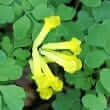Background
- Various types of corydalis have been included in traditional Chinese medicine (TCM) preparations and are most commonly used for the treatment of gastritis-like disorders. Corydalis has been studied for other medical conditions, including pain caused by intense cold, parasitic infections, irregular heart rhythms, chest pain, and bacterial infections (especially from Helicobacter pylori). There is currently not enough human evidence to support these or any uses of corydalis.
- Corydalis may interact with certain medications, including sedatives, hypnotics, drugs taken for irregular heart rhythms, some pain relievers, and anti-cancer drugs and may be unsafe for use during pregnancy.
References
Natural Standard developed the above evidence-based information based on a thorough systematic review of the available scientific articles. For comprehensive information about alternative and complementary therapies on the professional level, go to . Selected references are listed below.
- Chen QM, Ye YC, Xu ZJ, et al. [Electron microscopic studies on the effect of Corydalis stricta Steph on human Echinococcus granulosus and protoscolices]. Zhongguo Ji.Sheng Chong.Xue.Yu Ji.Sheng Chong Bing Za Zhi. 1987;5(4):281-3, 16.
View Abstract - Chen QM, Ye YC, Xu ZJ. [Experimental study on the effect of Corydalis stricta Steph. against Echinococcus granulosus protoscolices in man]. Zhonghua Wai Ke Za Zhi. 1986;24(12):768-9, 783.
View Abstract - Choi SU, Baek NI, Kim SH, et al. Cytotoxic isoquinoline alkaloids from the aerial parts of Corydalis incisa. Arch Pharm Res. 2007;30(2):151-154.
View Abstract - Kim HR, Min HY, Jeong YH, et al. Cytotoxic constituents from the whole plant of Corydalis pallida. Arch Pharm Res. 2005;28(11):1224-1227.
View Abstract - Li Y, Xu C, Zhang Q, et al. In vitro anti-Helicobacter pylori action of 30 Chinese herbal medicines used to treat ulcer diseases. J Ethnopharmacol. 4-26-2005;98(3):329-333.
View Abstract - Li HL, Zhang WD, Liu RH, et al. Simultaneous determination of four active alkaloids from a traditional Chinese medicine Corydalis saxicola Bunting. (Yanhuanglian) in plasma and urine samples by LC-MS-MS. J Chromatogr B Analyt Technol Biomed Life Sci. 2-2-2006;831(1-2):140-146.
View Abstract - Ma SX, Chen KJ. [Current status of research on the Chinese medicinal herb Corydalis yanhusuo]. Zhong Xi Yi Jie He Za Zhi. 1985;5(12):758-760.
View Abstract - Ma SX. [Clinical studies in the treatment of premature systoles with alkaloids of Corydalis yanhusuo]. Zhonghua Xin Xue Guan Bing Za Zhi. 1983;11(1):6-10.
View Abstract - Ponting CP. P100, a transcriptional coactivator, is a human homologue of staphylococcal nuclease. Protein Sci. 1997;6(2):459-463.
View Abstract - Wang HX, Ng TB. Examination of lectins, polysaccharopeptide, polysaccharide, alkaloid, coumarin and trypsin inhibitors for inhibitory activity against human immunodeficiency virus reverse transcriptase and glycohydrolases. Planta Med. 2001;67(7):669-672.
View Abstract - Wang DJ, Mao HY, Lei M. [Rotundium in the treatment of atrial fibrillation]. Zhongguo Zhong Xi Yi Jie He Za Zhi. 1993;13(8):455-7, 451.
View Abstract - Xie C, Kokubun T, Houghton PJ, et al. Antibacterial activity of the Chinese traditional medicine, Zi Hua Di Ding. Phytother Res. 2004;18(6):497-500.
View Abstract - Yuan CS, Mehendale SR, Wang CZ, et al. Effects of Corydalis yanhusuo and Angelicae dahuricae on cold pressor-induced pain in humans: a controlled trial. J Clin Pharmacol. 2004;44(11):1323-1327.
View Abstract - Zhang L, Yang LW, Yang LJ. [Relation between Helicobacter pylori and pathogenesis of chronic atrophic gastritis and the research of its prevention and treatment]. Zhongguo Zhong Xi Yi Jie He.Za Zhi. 1992;12(9):521-526.
View Abstract - Zhu XZ. Development of natural products as drugs acting on central nervous system. Mem Inst Oswaldo Cruz 1991;86 Suppl 2:173-175.
View Abstract







